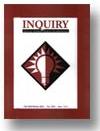Critical Thinking
Critical thinking can be defined as the art of taking charge of your own mind. Critical thinking can, and should, be used each day. Living in the information age, we are under a constant barrage of opinions, facts, and information. The basic concept of critical thinking is simple. "If we can take charge of our own minds, we can take charge of our lives; we can improve them, bringing them under our "self command" and direction (McCall and Kaplan, 1990)." This will require that we learn self discipline and the art of self examination. This means that we will have to become interested in how our mind works. With this knowledge we can then monitor, fine tune, and modify the way our brain processes information for the better. It will involve getting into the habit of ponderingly our impulsive and usual ways of thinking and acting in every dimension of our lives.
Kurland (1995) more thoroughly defines critical thinking as being concerned with reason, intellectual honesty, and open-mindedness, as opposed to emotionalism, intellectual laziness, and closed-mindedness. Kurland's definition covers all the main aspects of critical thinking quite clearly. If I were to sum up critical thinking in one word, it would be open-mindedness.
Decision Making
Making a decision can range in importance and complexity from "What should I have for dinner?" to "Should we invade Iraq?" McCall and Kaplan (1990) define decision making as "A stream of choices." I like this definition as it simplifies a potentially messy process. Decisions tend to pile up upon one another. One decision's outcome can lead to other problems, which require more decisions to be made, and so on. Harris (1997) further defines "Decision making is the process of sufficiently reducing uncertainty and doubt about alternatives to allow a reasonable choice to...

![[Edward McCall presents a silver basket of flowers to New York Giants manager John McGraw at Polo Grounds, NY (baseball)] (LOC)](https://s.writework.com/uploads/3/32066/edward-mccall-presents-silver-basket-flowers-new-york-giant-thumb.jpg)

Excellent
The essay was nicely structured, and provided many good proofs including allusions and quotes. As a possible improvement, perhaps the introduction could introduce the topics relating to critical thinking of which you will speak. Great use of descriptive words! Good job.
4 out of 5 people found this comment useful.